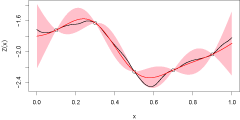
With a simulator in hand, scientists are able to adjust inputs to computer codes and observe the impact on a system. Many computer models require the specification of a large number of input settings and/or are computationally demanding. As a result, only a relatively small number of simulation runs tend to be carried out. Scientists must therefore select the simulation trials judiciously and perform a computer experiment. Unlike physical experiments, computer experiments frequently are deterministic - noiseless - and, therefore require new statistical development.
The Program for the Design and Analysis of Computer Experiments for Complex Systems aims to develop new statistical methodology for helping scientists explore complex computer simulators. The types of data structures dealt with are as varied as the applications. One is faced with univariate, multivariate, functional and space-time data, just to name a few. In addition, we are also often faced with large volumes of data. Current collaborations include work with atmospheric scientists, cosmologists and materials scientists. Our goal is to provide efficient and practical methodology for conducting and analyzing computer experiments.